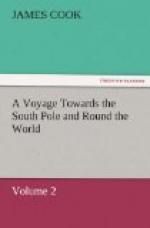Hauling up under the east side of the land which divided the two arms, and seeing a small cove ahead, I sent a boat to sound; and we kept as near the shore as the flurries from the land would permit, in order to be able to get into this place, if there should be anchorage. The boat soon returned, and informed us that there was thirty and twenty-five fathoms water, a full cable’s length from the shore; here we anchored in thirty fathoms, the bottom sand and broken shells; and carried out a kedge and hawser to steady the ship for the night.
CHAPTER II.
Transactions in Christmas Sound, with an Account of the Country and its Inhabitants.
1774 December
The morning of the 21st was calm and pleasant. After breakfast I set out with two boats to look for a more secure station. We no sooner got round, or above the point, under which the ship lay, than we found a cove in which was anchorage in thirty, twenty, and fifteen fathoms, the bottom stones and sand. At the head of the cove was a stony beach, a valley covered with wood, and a stream of fresh water, so that there was every thing we could expect to find in such a place, or rather more; for we shot three geese out of four that we saw, and caught some young ones, which we afterwards let go.
After discovering and sounding this cove, I sent Lieutenant Clerke, who commanded the other boat, on board, with orders to remove the ship into this place, while I proceeded farther up the inlet. I presently saw that the land we were under, which disjoined the two arms, as mentioned before, was an island, at the north end of which the two channels united. After this I hastened on board, and found every thing in readiness to weigh, which was accordingly done, and all the boats sent ahead to tow the ship round the point. But at that moment a light breeze came in from the sea too scant to fill our sails, so that we were obliged to drop the anchor again, for fear of falling upon the point, and to carry out a kedge to windward. That being done, we hove up the anchor, warped up to, and weighed the kedge, and proceeding round the point under our stay-sails; there anchored with the best bower in twenty fathoms; and moored with the other bower, which lay to the north, in thirteen fathoms. In this position we were shut in from the sea by the point above-mentioned, which was in one with the extremity of the inlet to the east. Some islets, off the next point above us, covered us from the N.W., from which quarter the wind had the greatest fetch, and our distance from the shore was about one-third of a mile.
Thus situated we went to work, to clear a place to fill water, to cut wood, and to set up a tent for the reception of a guard, which was thought necessary, as we had already discovered that, barren as this country is, it was not without people, though we had not yet seen any. Mr Wales also got his observatory and instruments on shore; but it was with the greatest difficulty he could find a place of sufficient stability, and clear of the mountains, which every where surrounded us, to set them up in; and at last he was obliged to content himself with the top of a rock not more than nine feet over.




